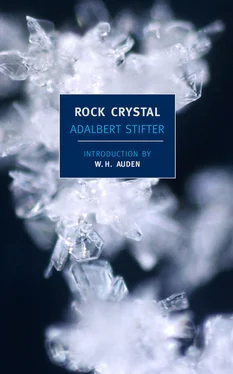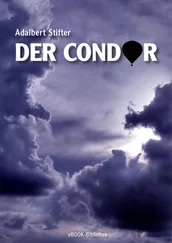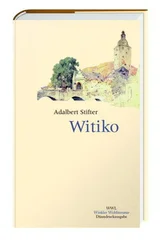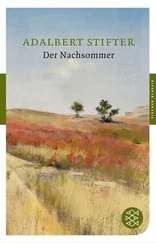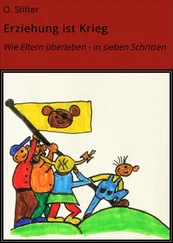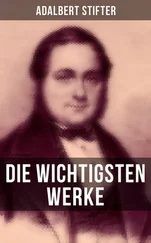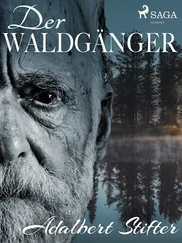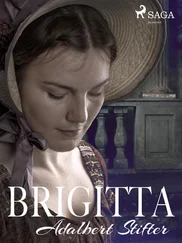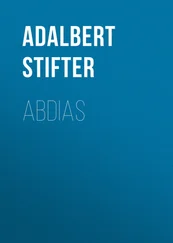They walked quickly along the square and the row of houses, past the picket fences of the orchards, and finally came into the open. The sun had already risen over the woodlands on the eastern heights that were still shot with wefts of pale mist, — the dull reddish ball keeping pace with them through the leafless branches of the crab-apple trees.
There was no snow anywhere in the valley; the higher mountains which had been glistening for weeks, were covered with it; the lower ones stood snowless and silent in their pine-mantle of green and fallow brown of bare branches. The ground was not yet frozen and would have been quite dry because of the long stretch without rain, if the cold had not overlaid it with a faint moisture, which instead of making it slippery, had made it all the safer and so resilient that walking was easy. The sparse grass still on the meadows and particularly along the ditches, had an autumn look. There was no frost on the grass and examined closely, not even any dew, all of which interpreted locally was a sign that rain was imminent.
Down toward the far edge of the meadow was a mountain brook crossed by a high plank. The children walked along the plank and looked down. There was scarcely any water in the brook, a mere thread of intense blue on the stony bed, the dry pebbles having become perfectly white in the long weeks without rain, and the scantness as well as the color of the water meant bitter cold at the higher altitudes — cold that held the ground in a vise so it could not make the brook turbid with sediment, and hardening the ice so the core gave off only a few clear drops.
From the foot-bridge the children raced over the meadows, closer and closer to the woodland.
They came at last to the outskirts of the forest and went on into it.
When they had climbed into the higher woods of the neck, the long ruts in the cart-road were not soft as they had been in the valley, but firm, because they were frozen; in some places hard enough to bear the children’s weight. Child-like, they no longer kept to the smooth path by the road but walked in the ruts, seeing which ridges would bear their weight. When in an hour they had reached the crest of the col, the ground was by that time so hard their steps rang and the clods were like iron.
Sanna was the first to notice at the shrine erected in memory of the baker, that the red post supporting the tablet was no longer there. They went closer and saw that it lay in the dry grass that stood up like pale straw, partly concealing it. They did not see why the post should be lying there — whether it had been thrown down or had fallen of itself — but they did see the wood rotted where it came out of the ground, and that it might have toppled over of itself; but as it lay there, they were glad to be able to have a closer look at the picture and the inscription. When they had studied it all, — the basket with the rolls, the whitish hands of the baker, his closed eyes, his gray coat, and the pines about him — had spelled out the legend and then said it out loud — they proceeded on their way.
Another hour and the dark woods on both sides were dim behind them; thin-set trees, part single oaks, part birch and clusters of scrub, met the eye, continuing with them a distance and shortly after, the children were running down through the meadows into the valley of Millsdorf.
Although this valley is considerably lower than that of Gschaid and is therefore so much warmer that harvest begins two weeks earlier than in Gschaid, the ground here was frozen too; and when the children came to their grandfather’s tannery and fulling-mill, they found in the road where the wheels scatter drops of water, thin sheets of cat’s-ice, ever a delight to children.
Their grandmother had seen them and coming out to meet them, took Sanna’s little cold hands in hers and led the children inside.
She undid their wraps, had fresh wood put in the stove, and asked what had happened on the way over.
When they had answered, she said: “That’s good, that’s all right, I am glad you came, but this time you must be off very soon, the days are short and it is getting colder; nothing was frozen in Millsdorf this morning.”
“Nor in Gschaid,” said the lad.
“See? You must hurry then so you won’t be too cold by evening,” answered their grandmother.
Then she asked how their mother was, how was their father, and had anything happened in Gschaid.
After these inquiries she busied herself with the meal, made sure it would be on the table earlier than usual, and herself prepared little appetizing things for the children that she knew they liked. Then the dyer was called in, the children sat down at the table laid for them as for grownups, ate with their grandfather and grandmother, the latter piling good things on their plates. After dinner, she patted Sanna’s cheek, quite rosy by this time. Then she bustled about here and there, packing to overflowing the lad’s calfskin pouch, besides stuffing things into his pockets. She also put divers things into Sanna’s little pockets, gave them each a piece of bread to eat on the way, and in the bag, she told them, were two rolls in case they became very hungry.
“For your mother,” she said, “I am giving you some well-roasted coffee-beans, and in the very tightly wrapped bottle with the stopper is some black coffee extract better than your mother herself usually makes; she can taste some just as it is; it is a veritable tonic, so strong the merest sip warms the stomach so that you cannot feel chilled even on the coldest of winter days. The other things in the bag, in the cardboard box wrapped with paper, you are to take home without opening.”
After a word or two more with the children, she said they must go.
“Take good care, Sanna,” she said, “not to get chilled; don’t get overheated; and don’t you run up over the meadows and under the trees. The wind may come up toward evening and then you will have to go slower. Greetings to Father and Mother, and tell them we wish them a right merry Christmas.” She kissed them each on the cheek, and hastened them forth. But she accompanied them through the garden, let them out by the rear gate, shut it again, and came back into the house.
The children went past the thin sheets of cat’s-ice beside their grandfather’s mill, crossed the fields and turned up toward the rising meadows.
When they had come to the heights covered with scattered trees and thickets of scrub, already mentioned, some few snowflakes floated slowly down.
“See there, Sanna,” said the lad. “I knew it would snow; remember when we left home, we could still see the sun, as red as the lamp over the Holy Sepulcher in church during Holy Week, and now we can’t see even the faintest ray and there’s only gray fog up there over the tree-tops. That always means snow.”
The children walked on more briskly, and Sanna was delighted whenever she caught a falling flake on the sleeve of her dark coat and it did not melt for a long time. When finally they came to the further fringe of the Millsdorf heights before entering the dark woods on the col, the serried wall of pines was already prettily flecked with the fast-falling snow. They now entered the deep woods, the longest part of the remaining way home. Up and up, from the fringe of the forest, the ground rises till one comes to the red post of the wayside shrine, from where as we said before the road turns off down to Gschaid. The ascent through the woods is so steep from the Millsdorf side that the road does not lead straight up but in wide serpentines, west to east and east to west. At each side of the road, the whole way up to the shrine and down to the meadows of Gschaid, there are impenetrable densely towering woods that thin only a little as one gains the valley level and comes out on the meadows in the valley of Gschaid. The col itself, though but a small link between two great ranges, would, if set on the floor of the valley, be a considerable mountain-chain.
Читать дальше
